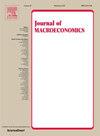什么在吃宏观?
IF 1.5
3区 经济学
Q3 ECONOMICS
引用次数: 0
摘要
本文的出发点是对杰里米-陆克文(Jeremy Rudd)所著《宏观经济学实用指南》(A Practical Guide to Macroeconomics)一书的评论。该书认为,宏观经济学在学术界的实践以及通过政策机构的过滤,为政策如何以及应该如何在实践中发挥作用提供了一个非常不完善的指南。这篇评论评估了书中概述的论点,讨论了书中没有提到的一些问题,并探讨了在学术和政策宏观之间出现的更普遍的主题。本文章由计算机程序翻译,如有差异,请以英文原文为准。
What's eating macro?
The starting point for this article is a review of the book A Practical Guide to Macroeconomics by Jeremy Rudd. The book argues that macroeconomics, as practiced in academia and filtered through to policy institutions, has provided a highly imperfect guide for how policy works and should work in practice. This review assesses the arguments outlined in the book, discusses some issues absent from the book, and addresses more general themes that arise in the interface between academic and policy macro.
求助全文
通过发布文献求助,成功后即可免费获取论文全文。
去求助
来源期刊

Journal of Macroeconomics
ECONOMICS-
CiteScore
2.50
自引率
7.10%
发文量
53
审稿时长
76 days
期刊介绍:
Since its inception in 1979, the Journal of Macroeconomics has published theoretical and empirical articles that span the entire range of macroeconomics and monetary economics. More specifically, the editors encourage the submission of high quality papers that are concerned with the theoretical or empirical aspects of the following broadly defined topics: economic growth, economic fluctuations, the effects of monetary and fiscal policy, the political aspects of macroeconomics, exchange rate determination and other elements of open economy macroeconomics, the macroeconomics of income inequality, and macroeconomic forecasting.
 求助内容:
求助内容: 应助结果提醒方式:
应助结果提醒方式:


